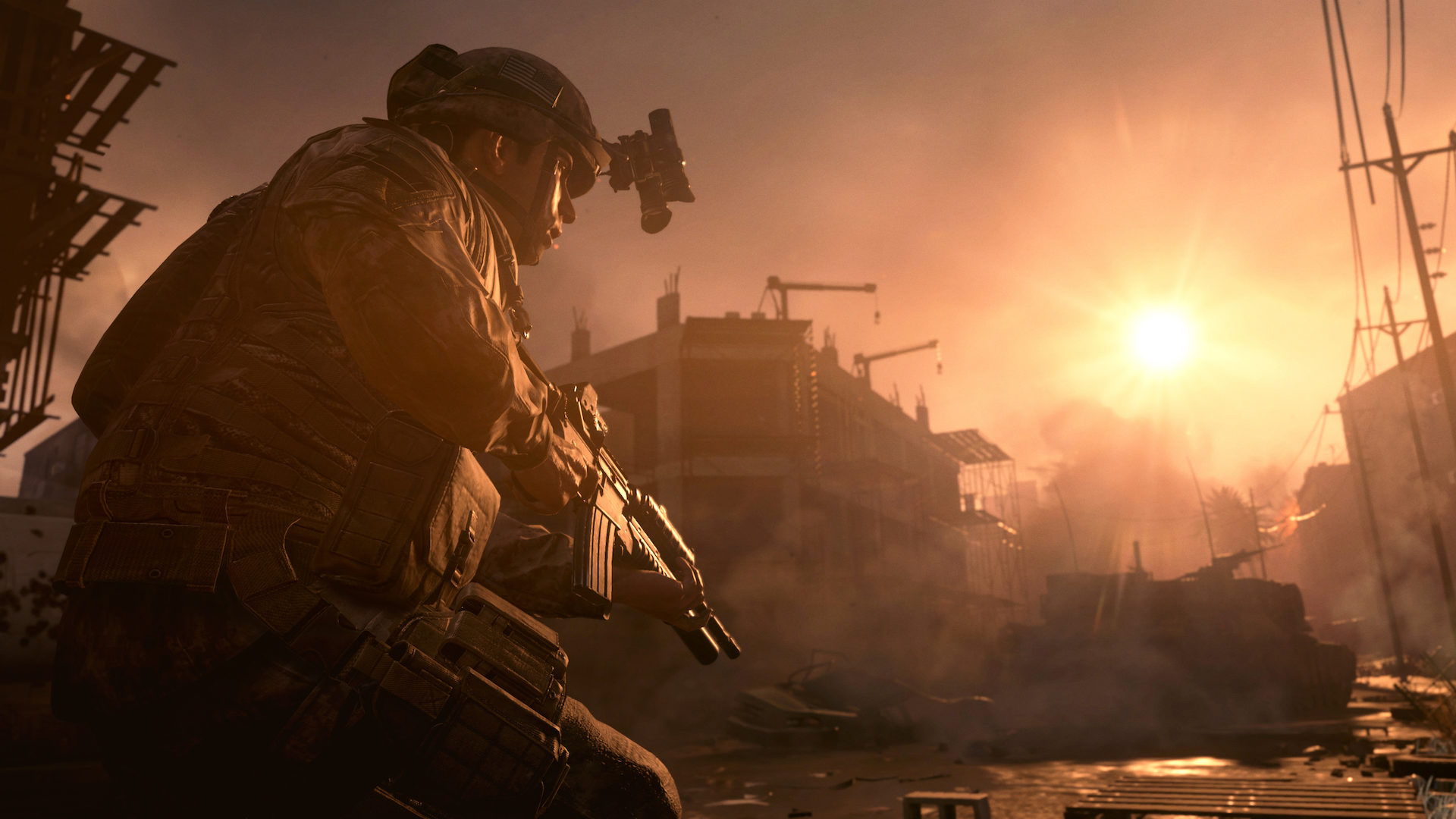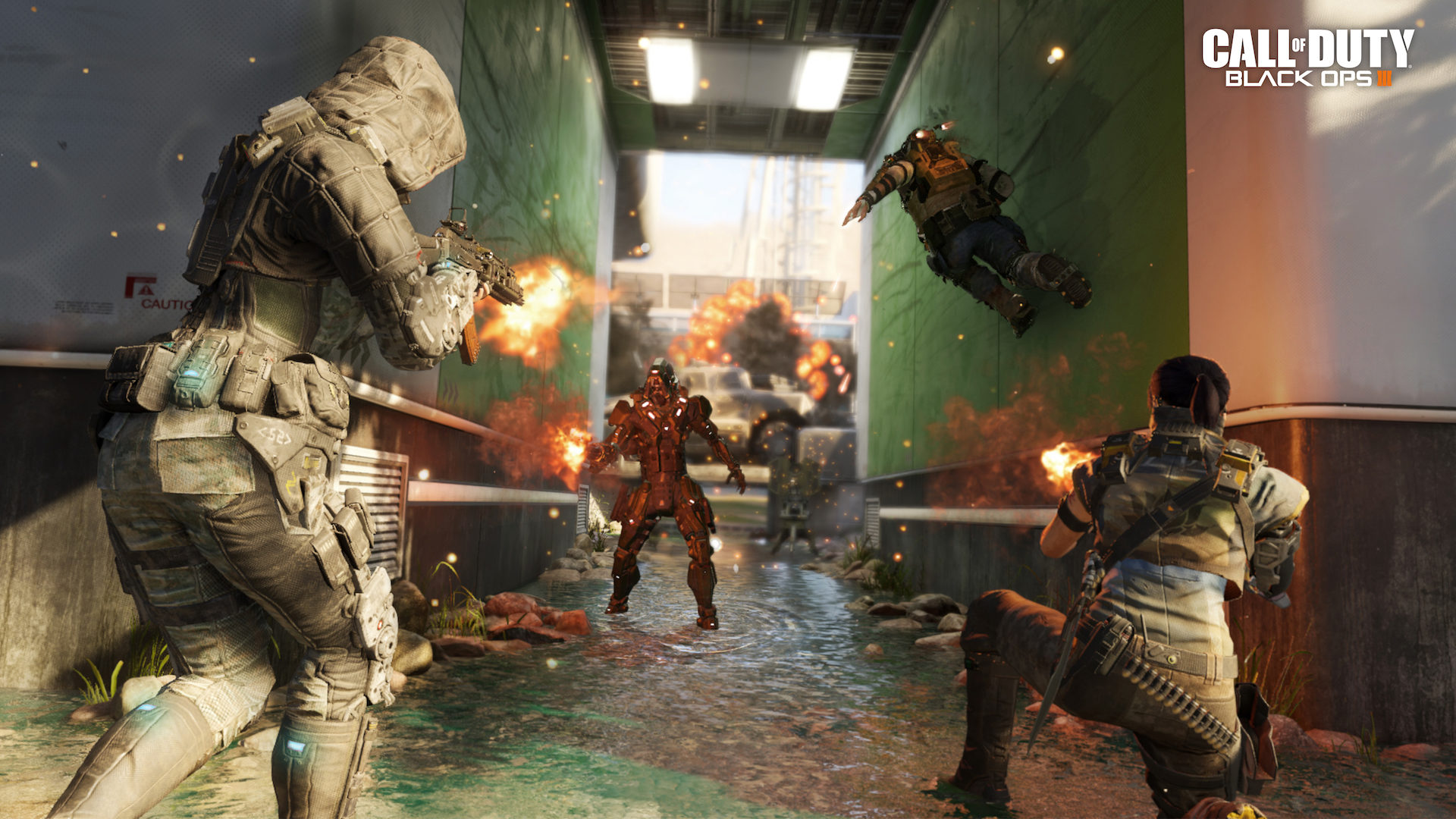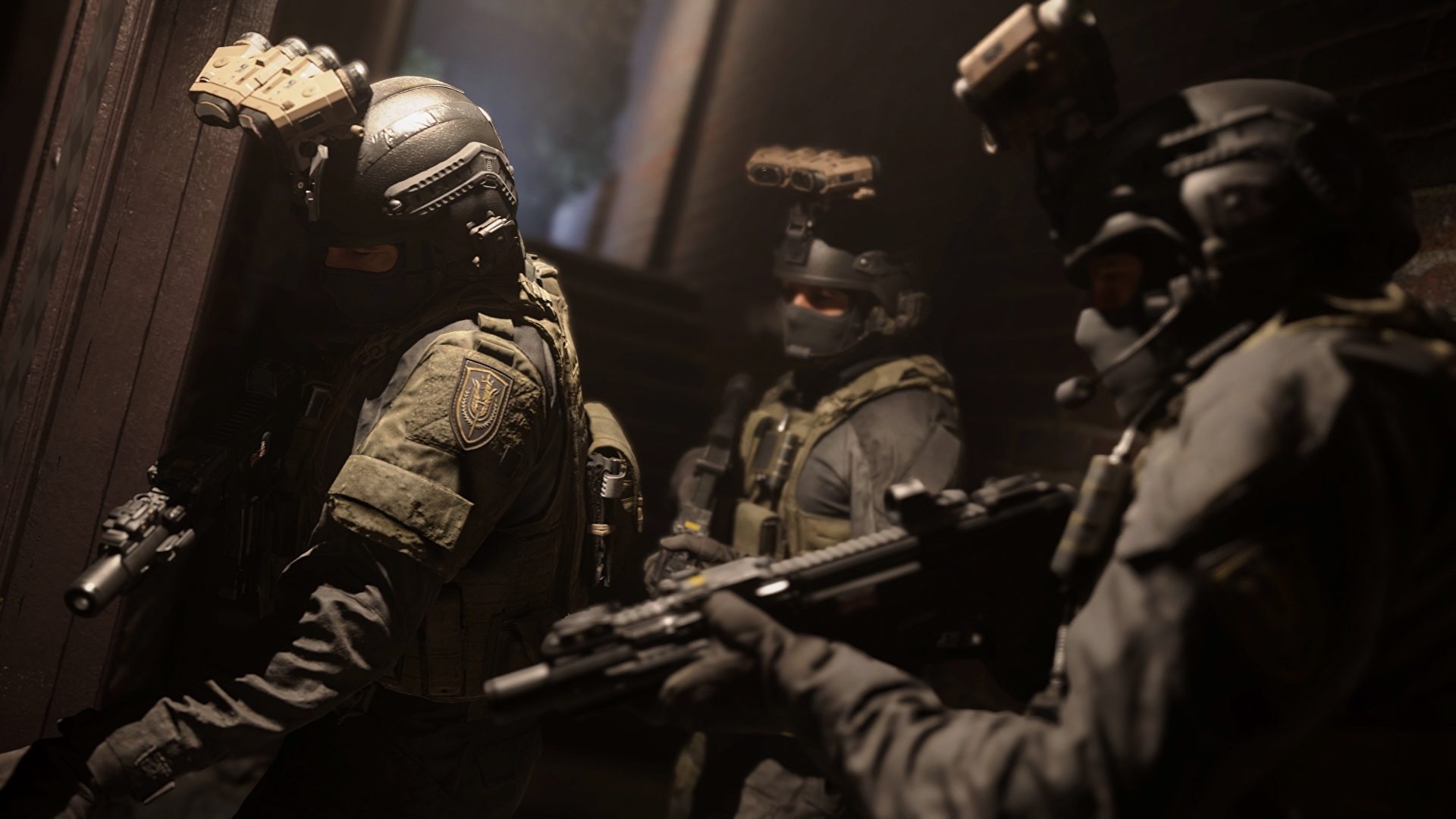What exactly is Call of Duty, anyway?
Your answer to that question will vary wildly based on your perspective within the world of gaming. For those turned off by its gung-ho machismo and graphic depictions of fictionalized military conflicts, the series is a massive billboard that advertises a pernicious and pervasive stereotype of the hobby—ultraviolent first-person shooters that rely on a combination of latent jingoism and addictive gunplay to hook the masses. For hardcore gamers whose interest has waned over its decade-plus reign, the name Call of Duty has become a byword for the creative conservatism that so often paralyzes the “franchises” that crowd the summit of Steam and elsewhere year-after-year. My own friend group falls almost entirely in this latter camp: When I suggested that we check out last year’s entry, Modern Warfare, one of them simply said: “What’s the point? It’s the same every year anyway.”
Still, though battle royale fare such as the industry-defining Fortnite and Apex Legends tend to dominate the headlines these days, the CoD machine lurches on, with this latest Modern Warfare pulling in more than $600 million in its first three days, making it the most successful game in the franchise this console generation. While the franchise has lost some steam over the years, rumors of its death are greatly exaggerated; all 10 CoD titles released from 2010 to 2019 were in the top 20 best-selling games of that decade. Even the much-derided Infinite Warfare sold better than the best-selling Battlefield entry.

Credit: Call of Duty: Infinite Warfare, Activision
For many fans, casual and die-hard alike, the series is an adrenaline-soaked respite from the drudgery of their everyday lives, a way to unwind after a long shift at work. Some of them say that its consistency is its greatest strength, but others decry the comparisons to annualized sports games (and their attendant “roster update” jokes) as unfair. While CoD might exhibit many superficial similarities year-on-year, they argue, each entry exhibits idiosyncrasies and tweaks that give it a unique identity when compared to its forebears, and many critics of the franchise have a tendency to miss these details.
For the most part, CoD fans all agree that the series has one chief virtue, one that massively contributes to its continued success: simplicity. Ever since Call of Duty 4: Modern Warfare (not to be confused with the most recent entry, which shares the same subtitle) first entwined fast-paced multiplayer matches with a constant drip-feed of ranks and guns, that satisfying grind has served as CoD’s bedrock. And while more recent incarnations piled on more content—revamped modes, bombastic weapons, ridiculous killstreaks—for some, it’s the strength of this core structure that keeps them coming back for more, and this complexity can sometimes get in the way of their enjoyment.
“The series has gotten complicated,” said Joseph Yaden, a writer at the video game site PlayStation Lifestyle and long-time Call of Duty player, who first came into the fold with the original Modern Warfare. “That isn’t inherently bad, but it can be a turn-off to new players… I wish the later installments would feature a ‘Classic’ mode that only has the three original killstreaks: UAV, Airstrike, Helicopter. That way, you could jump into a game with the intention of playing a bit more aggressively, or play the normal mode and hide in one spot to safely earn your precious killstreak.”

Credit: Activision
Of the fans I talked to, nearly all of them named the original Modern Warfare or its follow-up Modern Warfare 2 as their favorite game in the series, citing the purity of their design as their main appeal over more recent entries. However, as Yaden points out, the differences between the likes of 2018’s Black Ops 4 and MW2 are substantial—both in the “nuts and bolts” of map and weapon design, and also in terms of tone and setting—but ultimately subjective. That’s why the more popular games in the franchise continue to boast very active playerbases for years after launch. “Certain maps strike a chord with the audience, and they have a hard time moving to a new game,” Yaden said. “Really, it could be anything: game modes, weapons, different ‘feels.’ Some players loathe the futuristic time periods, while others prefer the WWII aesthetic… It’s interesting, because even the same weapon might feel differently in two different games. The MP5 in 2019’s Modern Warfare sounds slightly differently than the one in Call of Duty 4. Because it’s not what I’m used to, I don’t connect to it as much.”
“There’s no brand loyalty in CoD,” said one Reddit user. “If the CoD is good, you play it until it gets overrun by hackers, or nobody plays it anymore and lobbies are empty. The playtime of a good CoD could be years.”
When it comes to a cash cow like Call of Duty, it only makes sense that the developers would be hesitant to radically overhaul any major elements; after all, it’s hard to justify tinkering with the money faucet. That said, the various studios tasked with cranking out a new CoD every year have managed to introduce new modes and features with each installment, usually with mixed success. The addition of Overwatch-style “ultimates” to the later Black Ops games remains one of the series’ most divisive moves—while I personally enjoyed disabling the entire enemy team with an electrified sniper rifle, it didn’t exactly feel like a viable future for a game that made its bones prioritizing accessible fun over all else.
Aficionados cite the franchise’s dalliances with sci-fi as a constant source of tension within the playerbase, with several of them describing Advanced Warfare’s double-jump and Infinite Warfare’s wall-running as mere imitations of then-popular trends within the first-person shooter genre. But while certain segments of the game’s massive audience might hunger for fresh ideas, these new mechanics and modes rarely manage to become a part of its core formula, with most of them becoming footnotes on the series’ wiki. The players that do appreciate these more radical decisions stick with the game well-past its year-long lifespan, and the cycle continues, the community remaining as fractured as before.
“I think Call of Duty likes to borrow strong elements from other shooters, like Titanfall and Battlefield, and that sometimes those things don’t fit the series very well,” said Alex Kane, a journalist and long-time player. “The parkour stuff in Black Ops III was straight out of Titanfall. It worked well in the futuristic setting, but it’s still controversial.”

Credit: Activision
This dichotomy between the franchise’s latent conservatism and the community’s desire for evolution is quite apparent in 2019’s Modern Warfare. Several of the fans I talked to expressed particular dislike for the new, much-vaunted Ground War mode, which relies on vehicles and a high player count for a grander scale of conflict than the traditional tight corridor-to-corridor shootouts. (“It’s a little embarrassing, honestly,” one said. “They’re still chasing the Battlefield thing, even now.”) By that same token, however, almost every single person I spoke with singled out the new 2 vs. 2 mode, Gunfight, as one of the best additions to Call of Duty in years. (Although previous games in the series had featured somewhat similar small-scale modes before, such as MW2’s Face-Off, this new mode bears a certain resemblance to Wingman, a similarly well-received 2 vs. 2 mode in Counter-Strike: Global Offensive). “I cannot stop playing it… it’s phenomenal,” Kane said. “I can play it with a friend knowing we’re not at the mercy of random teammates who’re going to lose the game for us.”
While the new elements that each subsequent installment introduces serve as obvious flashpoints for fan discussion, many long-time players feel that some long-running issues have yet to be fully addressed. Calls for dedicated server support and the elimination of skill-based matchmaking—two favorite bugbears of the hardcore FPS community, which are hardly specific to Call of Duty—run rampant on the subreddit, and several fans I spoke to mentioned the viability of “camping” in 2019’s Modern Warfare as a major weakness. No topic is too sacred; some enthusiasts even debate the competitive merits of the famously overpowered killstreaks, arguably the series’ signature feature. But while most of the fans I spoke to described this new Modern Warfare as one of Call of Duty’s high-water marks, as the franchise emerges from a greater creative realignment—or, as one fan described it, a “holding pattern”—that followed the relative weak sales of 2016’s spacefaring Infinite Warfare, its future still remains murky.
Consider Modern Warfare’s single-player campaign, which was roundly-criticized for glorifying the “reality” of Western military adventurism, with the heaviest fire coming due to an utterly confounding attempt to paint over real-life US war crimes with a hammer and sickle. While the multiplayer thankfully excludes much of that “gritty” propaganda—with the exception of the white phosphorous killstreak, which prompted some well-founded concerns—the series seems to be stumbling for a false sense of military authenticity, or what game designer and franchise fan Spencer Yan dubs “Zero Dark Thirty a la Michael Bay.”

Credit: Activision
“Call of Duty has always been about very small-scale, one-on-one engagements, and for that reason, it’s been able to maintain a kind of gameplay ‘purity’ that a lot of other FPSes aren’t able to capture quite as well,” Yan said. “CoD, more so than any other FPS I’ve played, is very much a game where the gun is the preeminent mode and agent of gameplay; everything else (moving, positioning, etc.) emerges in relation to the gun… While I’m not averse to CoD exploring a direction that emphasizes careful movement, I feel that this ‘authenticity’ doesn’t embrace what makes CoD truly unique amongst shooters. I’d rather them go back to making games about corrupt military-industrial corporations and rogue Russian superterrorists.”
As long as the killstreaks keep triggering and the guns keep roaring, it’s unclear if the media conglomerate known as Call of Duty will ever truly fail. But one thing’s for sure: While the series might lack a coherent identity, from a certain perspective, you might even argue that this thematic murkiness is a major part of the series’ continued success. The machinery inside might look largely the same, but a few tweaks and a new coat of paint keeps the new players rolling in.
There is no one Call of Duty—just infinite men with infinite guns, in a dozen different theatres of a forever war, marking time as they run down an endless list of reasons why we all want to kill each other. And while that versatility has kept the machine running for a decade-plus now, it remains to be seen if it can continue to mold itself to fit changing times.

Steven T. Wright is a reporter and novelist living in the Twin Cities. He is the former independent games columnist for Variety, and he has written for Rolling Stone, Polygon, Vice, and many others. He almost named his novel after a city in Final Fantasy, but his friends talked him out of it.